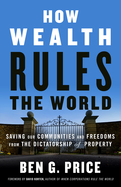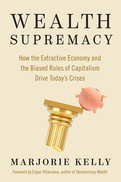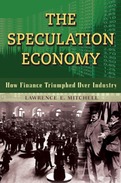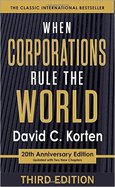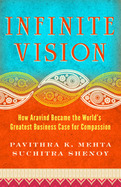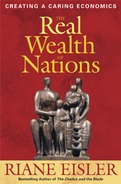Search Results: "how wealth rules"
Results 1-6 of 971
Crackdowns on local democracy are accelerating, as corporate and state interests continue efforts to repress social movements. In this well-timed book, Ben Price presciently reveals structures of power and law that facilitate blatant corporate supremacy in the United States. Price uses his years of experience as a community organizer and a careful reading of history to show how a legal paradigm that facilitated slavery and the fossil fuel economy has endured and adapted over time – today barricading our communities and squelching dissent.
Many books have been written about wealth, power and politics in the United States. Most of them make intuitive sense. Wealthy people use their power to influence and control politics. But Ben Price's new book is often counterintuitive as he explores how wealth itself is imbued with power. He answers questions such as:
How is the American Legislative Exchange Council – a modern states' rights, free market capitalist group – the intellectual and political descendant of George Washington's Federalist Party?
How was the Fourteenth Amendment that emancipated African American slaves from their status as property used by a reactionary Supreme Court to grant legal “personhood” to private corporations?
How are cities seen under our legal doctrine as “public corporations,” devoid of real governing authority?
Further, Price identifies key counterrevolutions in U.S. history that squelched the transformative potential of the Civil War and American Revolution, and traces the roots of colonial and imperial systems of control. He links them to modern “free trade” agreements and other antidemocratic structures used to supersede democracy to this day.
For some, this will come as no surprise. For others, it will be a rude, though necessary, awakening. “The white man's municipalities are just reservations, like ours,” said a resident of Pine Ridge Reservation, who Price spoke with. "The difference is, we know we live on reservations. The white man doesn't.”
Crucially, Price shares insight into how social movements can plant seeds of a new legal system that makes the liberty, civil rights and dignity of humans and ecosystems its ultimate purpose. In fact, he introduces the reader to people who are doing just that.
Many books have been written about wealth, power and politics in the United States. Most of them make intuitive sense. Wealthy people use their power to influence and control politics. But Ben Price's new book is often counterintuitive as he explores how wealth itself is imbued with power. He answers questions such as:
How is the American Legislative Exchange Council – a modern states' rights, free market capitalist group – the intellectual and political descendant of George Washington's Federalist Party?
How was the Fourteenth Amendment that emancipated African American slaves from their status as property used by a reactionary Supreme Court to grant legal “personhood” to private corporations?
How are cities seen under our legal doctrine as “public corporations,” devoid of real governing authority?
Further, Price identifies key counterrevolutions in U.S. history that squelched the transformative potential of the Civil War and American Revolution, and traces the roots of colonial and imperial systems of control. He links them to modern “free trade” agreements and other antidemocratic structures used to supersede democracy to this day.
For some, this will come as no surprise. For others, it will be a rude, though necessary, awakening. “The white man's municipalities are just reservations, like ours,” said a resident of Pine Ridge Reservation, who Price spoke with. "The difference is, we know we live on reservations. The white man doesn't.”
Crucially, Price shares insight into how social movements can plant seeds of a new legal system that makes the liberty, civil rights and dignity of humans and ecosystems its ultimate purpose. In fact, he introduces the reader to people who are doing just that.
Wealth Supremacy
2023
This powerful analysis explains how the bias toward wealth that is woven into the very fabric of American capitalism is damaging people, the economy, and the planet and explores what the foundations of a new economy could be.
This bold manifesto exposes seven myths underlying wealth supremacy—the bias that institutionalizes infinite extraction of wealth by and for the wealthy and is the hidden force behind economic injustice, the climate crisis, and so many other problems of our day:
The Myth of Maximizing—No amount of wealth is ever enough.
The Myth of Fiduciary Duty—Corporate managers' most sacred duty is to expand capital.
The Myth of Corporate Governance—Corporate membership must be reserved for capital alone.
The Myth of the Income Statement—Income to capital must always be increased, while income to labor must always be decreased.
The Myth of Materiality—Profit—that is, material gain-alone is real, while social and environmental damages are not.
The Myth of Takings—The first duty of government must be the protection of private property.
The Myth of the Free Market—There should be no limits on the sphere of influence of corporations and capital.
Kelly argues instead for the democratization of ownership: public ownership of vital services, worker-owned businesses, and more. And she sketches the outlines of a nonextractive capitalism that would be subordinate to the public interest. This is an ambitious reimagining of the very foundations of our economy and society.
This bold manifesto exposes seven myths underlying wealth supremacy—the bias that institutionalizes infinite extraction of wealth by and for the wealthy and is the hidden force behind economic injustice, the climate crisis, and so many other problems of our day:
The Myth of Maximizing—No amount of wealth is ever enough.
The Myth of Fiduciary Duty—Corporate managers' most sacred duty is to expand capital.
The Myth of Corporate Governance—Corporate membership must be reserved for capital alone.
The Myth of the Income Statement—Income to capital must always be increased, while income to labor must always be decreased.
The Myth of Materiality—Profit—that is, material gain-alone is real, while social and environmental damages are not.
The Myth of Takings—The first duty of government must be the protection of private property.
The Myth of the Free Market—There should be no limits on the sphere of influence of corporations and capital.
Kelly argues instead for the democratization of ownership: public ownership of vital services, worker-owned businesses, and more. And she sketches the outlines of a nonextractive capitalism that would be subordinate to the public interest. This is an ambitious reimagining of the very foundations of our economy and society.
As the 20th century dawned there was a silent but fateful transformation in the purpose of the American economy. Finance stopped serving industry and twisted industry to serve its own ends. THE SPECULATION ECONOMY shows this reversal of economic priorities, and its sometimes-disastrous consequences, demonstrated most recently by Enron.American companies once focused exclusively on providing the best products and services. But today, most corporations are obsessed with maximizing their stock prices, resulting in short-term thinking and the kind of cook-the-books corruption seen in the Enron and WorldCom scandals. How did this happen?
In this groundbreaking book, Lawrence E. Mitchell traces the origins of the problem to the first decade of the 20th century, when industrialists and bankers began merging existing companies into huge “combines”—today’s giant corporations—so they could profit by manufacturing and selling stock in these new entities. He describes and analyzes the legal changes that made this possible, the federal regulatory efforts that missed the significance of this transforming development, and the changes in American society and culture that led more and more Americans to enter the market, turning from relatively safe bonds to riskier common stock in the hopes of becoming rich. Financiers and the corporations they controlled encouraged this trend, but as stock ownership expanded and businesses were increasingly forced to cater to stockholders’ “get rich quick” expectations, a subtle but revolutionary shift in the nature of the American economy occurred: finance no longer served industry; instead, industry began to serve finance.
The Speculation Economy analyzes the history behind the opening of this economic Pandora’s box, the root cause of so many modern acts of corporate malfeasance.
• The first book to reveal the deep historical roots of the modern corporate obsession with stock price—a major cause of recent scandals like those at Enron and WorldCom
• Details how the rise of the modern corporation created the modern stock market—and why this led to an economy dominated by stock speculation
Our Choice: Democracy or Corporate Rule
A handful of corporations and financial institutions command an ever-greater concentration of economic and political power in an assault against markets, democracy, and life. It's a “suicide economy,” says David Korten, that destroys the very foundations of its own existence.
The bestselling 1995 edition of When Corporations Rule the World helped launch a global resistance against corporate domination. In this twentieth-anniversary edition, Korten shares insights from his personal experience as a participant in the growing movement for a New Economy. A new introduction documents the further concentration of wealth and corporate power since 1995 and explores why our institutions resolutely resist even modest reform. A new conclusion chapter outlines high-leverage opportunities for breakthrough change.
A handful of corporations and financial institutions command an ever-greater concentration of economic and political power in an assault against markets, democracy, and life. It's a “suicide economy,” says David Korten, that destroys the very foundations of its own existence.
The bestselling 1995 edition of When Corporations Rule the World helped launch a global resistance against corporate domination. In this twentieth-anniversary edition, Korten shares insights from his personal experience as a participant in the growing movement for a New Economy. A new introduction documents the further concentration of wealth and corporate power since 1995 and explores why our institutions resolutely resist even modest reform. A new conclusion chapter outlines high-leverage opportunities for breakthrough change.
Infinite Vision
2011
Explores the inspiring paradox of an extraordinary business that breaks all the rules.
When a crippling disease shattered his lifelong ambition, Dr. V (Venkataswamy) chose an impossible new dream: to cure the world of blindness. The tiny clinic he founded in India defied conventional business logic and is now the largest provider of eye care on the planet. At Aravind, patients choose whether to pay or not. Millions are treated for free, yet the organization remains stunningly self-reliant. Serving everyone from penniless farmers to the president, it delivers world-class outcomes at less than a hundredth of what similar services cost in advanced nations. Its model is emulated by organizations everywhere from Rwanda to San Francisco. Infinite Vision uncovers the radical principles behind Aravind’s baffling success. Charged with profound insights and stories, it draws readers to the heart of Dr. V’s selfless vision, proving how choices that seem quixotic can, when executed with compassion and integrity, yield incredible results—results that can light the eyes of millions.
Adam Smith's The Wealth of Nations provided the first, most influential and lasting explanation of the workings of modern economics. But with his focus on "the market" as the best mechanism for producing and distributing the necessities of life, Smith's concepts only told part of the story, leading to flawed economic models that devalue activities that fall outside of the market's parameters of buying and selling. The real wealth of nations, Riane Eisler argues, is not merely financial, but includes the contributions of people and our natural environment. Here, Eisler goes beyond the market to reexamine economics from a larger perspective--and shows that we must give visibility and value to the socially and economically essential work of caring for people and the planet if we are to meet the enormous challenges we are facing.
Eisler proposes a new "caring economics" that takes into account the full spectrum of economic activities--from the life--sustaining activities of the household, to the life-enriching activities of caregivers and communities, to the life-supporting processes of nature. She shows how our values are distorted by the economic double standard that devalues anything stereotypically associated with women and femininity; reveals how current economic models are based on a deep-seated culture of domination; and shows how human needs would be better served by economic models based on caring. Most importantly, she provides practical proposals for new economic inventions--new measures, policies, rules, and practices--to bring about a caring economics that fulfills human needs.
Like her classic The Chalice and the Blade, The Real Wealth of Nations is a bold and insightful look at how to create a society in which each of us can achieve the full measure of our humanity.
Eisler proposes a new "caring economics" that takes into account the full spectrum of economic activities--from the life--sustaining activities of the household, to the life-enriching activities of caregivers and communities, to the life-supporting processes of nature. She shows how our values are distorted by the economic double standard that devalues anything stereotypically associated with women and femininity; reveals how current economic models are based on a deep-seated culture of domination; and shows how human needs would be better served by economic models based on caring. Most importantly, she provides practical proposals for new economic inventions--new measures, policies, rules, and practices--to bring about a caring economics that fulfills human needs.
Like her classic The Chalice and the Blade, The Real Wealth of Nations is a bold and insightful look at how to create a society in which each of us can achieve the full measure of our humanity.
- From the author of the bestselling classic The Chalice and the Blade (over 500,000 sold)
- Proposes a dramatic new economic model that could help resolve many of the most critical problems we face today
- Offers concrete steps for putting this model into practice


